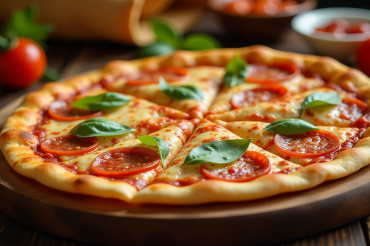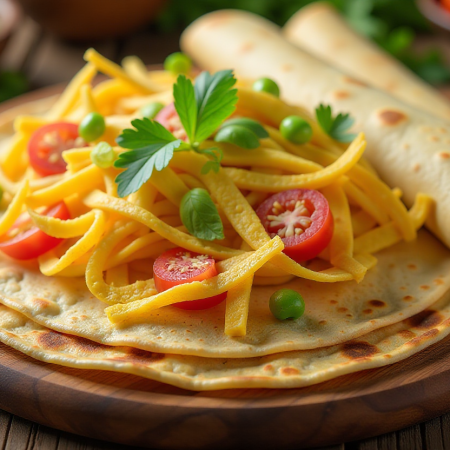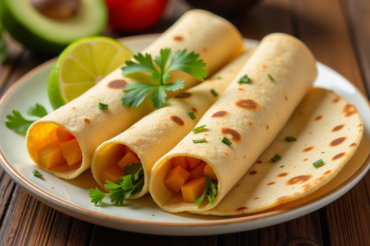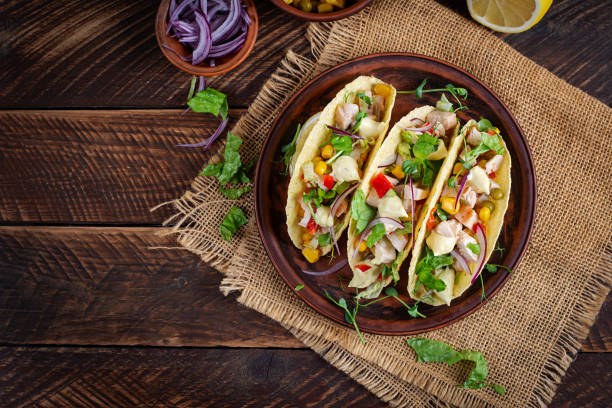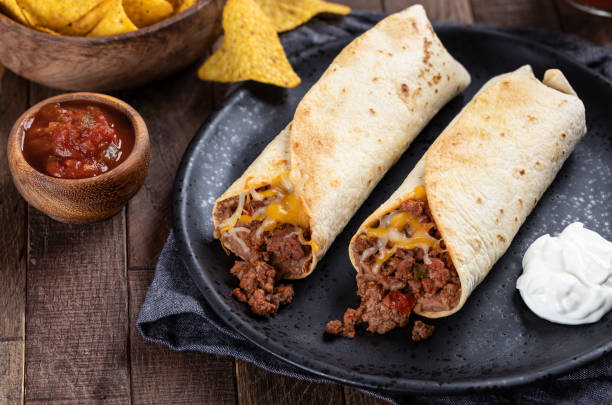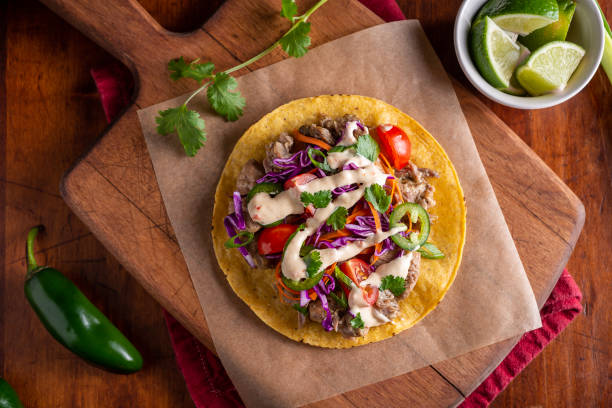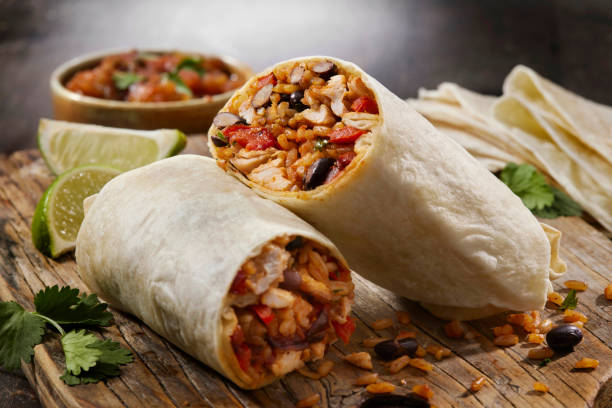
From burritos and wraps to quesadillas and flatbreads, flour wraps are a flexible and practical choice for a variety of dishes. They are a mainstay in many different cuisines and offer a versatile base for a variety of fillings, which makes them a popular option for quick and simple meals. But choosing the best Flour Wraps for your kitchen might be difficult with so many variations on the market. We’ll go over the main aspects of picking flour wraps in this post, such as taste, nutritional value, dietary requirements, and adaptability, so you can choose one that fits your tastes and lifestyle.
Understanding the Basics
Flour wraps, commonly known as tortillas, are flatbreads typically made from wheat flour, water, fat (such as oil or lard), and a leavening agent like baking powder. The basic ingredients and preparation methods can vary, influencing the texture, flavor, and nutritional content of the wraps. Understanding the primary ingredients used in making flour wraps is essential to choosing the right product for your kitchen.
Types of Flour Used in Wraps
· Refined White Flour:
Most traditional flour wraps are made using refined white flour, which has a soft texture and mild flavor. However, this type of flour is less nutritious because it has been stripped of the bran and germ during processing, removing much of the fiber, vitamins, and minerals.
· Whole-Wheat Flour:
Whole-wheat flour wraps are a healthier option as they retain the bran and germ, providing more fiber, protein, and nutrients. They have a denser texture and a nuttier flavor compared to white flour wraps.
· Alternative Flours:
In addition to wheat, some wraps are made with alternative flours like almond, coconut, chickpea, or spelt. These options are ideal for those with specific dietary needs or preferences, such as gluten-free or low-carb diets.
What to Look for in a Healthy Flour Wrap
When choosing flour wraps, nutrition should be one of the top considerations, especially if you’re aiming to incorporate them into a balanced diet. The nutritional value of a flour wrap can vary significantly depending on the type of flour used and the additional ingredients included in the product.
Key Nutritional Factors to Consider
Caloric Content:
The number of calories per wrap can vary based on size and ingredients. Standard white flour wraps may contain between 120-150 calories per serving, while low-carb or whole-wheat versions may differ slightly. Opt for wraps that fit your caloric needs, particularly if you are managing your weight or calorie intake.
Fiber Content:
Fiber is an important part of any diet, aiding in digestion and helping you feel full longer. Whole-wheat or multigrain wraps generally provide more fiber compared to white flour versions. Aim for wraps that offer at least 3-5 grams of fiber per serving for a more satisfying and nutritious meal.
Protein:
Protein helps build and repair tissues and keeps you feeling satisfied after meals. Wraps made from alternative flours like chickpea or almond may offer higher protein content, making them a better choice for those looking to increase their protein intake.
Sodium Levels:
Some commercial flour wraps are high in sodium, which can contribute to high blood pressure if consumed in excess. Check the labels and opt for low-sodium options if you are watching your salt intake.
Considering Dietary Needs
Different dietary needs require specific types of flour wraps, and luckily, the market offers a variety of options tailored to various diets. Whether you follow a gluten-free, low-carb, keto, or vegan diet, there are alternatives to traditional flour wraps that can suit your needs.
Gluten-Free Wraps
For those with gluten sensitivity or celiac disease, gluten-free wraps made from flours like almond, coconut, or corn are essential. These wraps provide a similar texture and flavor to traditional flour wraps without the gluten content. However, they may have different cooking or handling requirements, so it’s important to follow instructions carefully to achieve the desired result.
Low-Carb and Keto Wraps
If you’re following a low-carb or ketogenic diet, wraps made from almond flour or flaxseed are a great option. These wraps are designed to be low in carbohydrates while offering a decent amount of healthy fats and protein. Always check the net carb count (total carbs minus fiber) to ensure that the wraps fit your dietary goals.
Vegan and Plant-Based Wraps
Many wraps are naturally vegan, but it’s still important to check labels to ensure that no animal-derived ingredients, such as lard or eggs, are used. Wraps made from chickpea or lentil flour are excellent choices for vegans seeking a high-protein, plant-based option that is also rich in fiber and other nutrients.

A Trusted Tortilla Wrap Provider in Pakistan
Wrapster Tortillas is a leading provider of high-quality tortilla wraps in Pakistan, offering a wide range of options that cater to various dietary needs and preferences. Committed to freshness and taste, Wrapster Tortillas ensures that all its wraps are made with the finest ingredients, providing soft and flavorful tortillas that are perfect for any meal.
Finding the Right Wrap to Complement Your Meals
The texture and flavor of a flour wrap can significantly impact the overall taste and enjoyment of your meals. Depending on your culinary preferences and the types of dishes you plan to prepare, you may want to choose wraps that align with the flavors and textures you prefer.
Soft and Flexible Wraps
Soft and flexible wraps are ideal for making burritos, quesadillas, or soft tacos. They are pliable and easy to fold without tearing, which is essential for creating wraps that hold fillings securely. Whole-wheat or white flour wraps are often the best choices for these dishes.
Thicker and Sturdier Wraps
If you plan to use wraps for heavier fillings or grilled wraps like paninis, choose thicker and sturdier options like wraps made from almond or chickpea flour. These alternatives often have a slightly denser texture, which helps them hold up better when filled with ingredients like meats, cheeses, and vegetables.
Flavorful Wraps
Some wraps have unique flavors, such as those made with spinach, tomato, or herbs. These flavored wraps can add an extra layer of taste to your meals, making them a great choice for simple wraps that don’t require a lot of additional seasoning. However, keep in mind that some flavored wraps may contain added sugars or sodium, so always check the nutrition label.
Choosing Wraps That Suit a Range of Dishes
Flour wraps are incredibly versatile and can be used in a variety of dishes beyond the standard burrito or taco. When choosing wraps for your kitchen, think about the types of meals you enjoy cooking and select wraps that will work well with different fillings and cooking methods.
Breakfast Wraps
For breakfast, wraps can be used to create hearty breakfast burritos or simple egg and veggie wraps. Whole-wheat or low-carb options are excellent choices for the morning meal, providing a good balance of fiber and protein to start the day.
Lunch and Snack Wraps
For lunch, wraps are perfect for making quick sandwiches or veggie wraps. Wraps made from alternative flours like chickpea or spinach can add a burst of flavor and extra nutrients, making your lunch more nutritious and satisfying.
Dinner and Meal Prep
Flour wraps are also ideal for dinner and meal prep. Using larger and more durable wraps allows for the creation of full-sized burritos, enchiladas, or even wrap-based pizzas. If you meal prep, look for wraps that stay fresh for several days and don’t become soggy when reheated.
Ensuring Your Wraps Last Longer
Proper storage is key to maintaining the freshness and texture of your flour wraps. While some wraps are shelf-stable, others may need to be refrigerated or frozen to extend their shelf life.
Storing in the Pantry
Many commercially packaged wraps are designed to be stored at room temperature until opened. However, always check the expiration date and store them in a cool, dry place to avoid spoilage.
Refrigeration and Freezing
If you buy fresh wraps or open a package, storing them in the refrigerator can extend their freshness. Additionally, wraps can be frozen to prevent them from going stale. When freezing, place parchment paper between each wrap to prevent sticking and wrap them tightly in a plastic bag or container.
Balancing Cost and Quality
Finally, when choosing flour wraps, consider the balance between cost and quality. Some specialty wraps, such as gluten-free or low-carb versions, may be more expensive than standard flour or whole-wheat wraps. However, investing in high-quality wraps that meet your dietary needs and preferences can enhance your meals and support your health goals.
Buying in Bulk
For those who use flour wraps frequently, buying in bulk can be a cost-effective option. Many stores offer bulk packs that are more affordable per unit, and these can be stored in the freezer for long-term use.
Making Wraps at Home
Another way to save money is by making your own wraps at home. Homemade wraps allow you to control the ingredients, making them a healthier and more budget-friendly option. With simple ingredients like flour, water, and oil, you can create fresh, delicious wraps tailored to your taste and dietary requirements.
Budget, dietary requirements, taste preferences, and nutrition all play a role in selecting the best wheat wraps for your kitchen. You can choose flour wraps that suit your gastronomic tastes and health objectives by being aware of the various varieties that are available. Having the correct kind of wraps in your kitchen can improve your meals and offer countless options for quick and wholesome dinners, regardless of whether you choose whole-wheat, gluten-free, low-carb, or handmade options.


